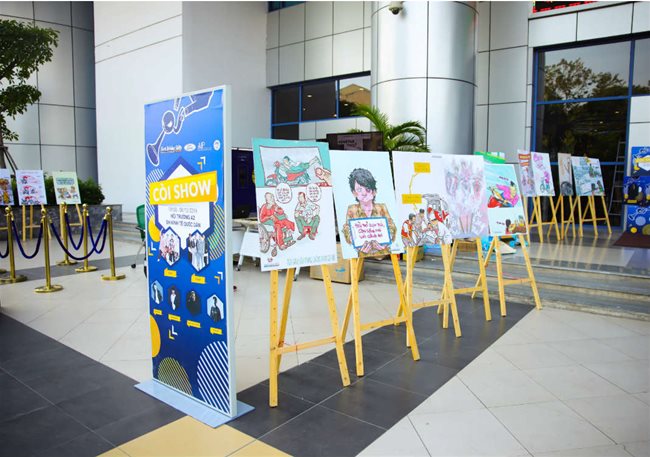HCMC – Leading carmaker Ford Vietnam has collaborated with local agencies and international organizations to help enhance road safety in Vietnam through many practical programs such as international seminars on road safety, helmet donations and driving skill courses over the past 12 years. Such a strenuous devotion over the long term has shown the automobile company’s commitment to the community in a sphere of its strength.
Through the Ford Driving Skills for Life (DSFL) program, Ford Vietnam had taught nearly 18,000 teen drivers and those freshly obtaining a driving license from across the country the necessary skills for safe driving beyond what they learn in standard driver education programs as of late 2019.
The DSFL training courses, which have been mostly organized in major cities and provinces, provide participants with hands-on and web-based curriculum at no cost. Ford DSFL training addresses both the areas of inexperience as well as the issues surrounding distracted and impaired driving.
The program aims to contribute to reducing road crashes, which are one of the leading causes of death for teenagers in Vietnam.
Alongside DSFL, the company has organized a number of campaigns like “K0 Coi” (No Honking) and “K0 Con” (No Alcohol) to raise the people’s awareness of road safety, especially among the youth.
These public awareness campaigns have attracted many young people and were participated by talented young artists, such as Le Thien Hieu, a famous young Vietnamese singer, to deliver road safety knowledge through a more creative approach.
A series of music events called “Coi Show” have been organized by Ford Vietnam in collaboration with the Asia Injury Prevention Foundation as part of the No Honking program since 2017. The events have reached over 3,300 students, all between the age of 16 and 24. With the aim of promoting a safer road culture and environment, the events gained the attention and support of the Vietnamese Government and the National Traffic Safety Committee.
The Coi Show also featured a photo exhibition named “Traffic in the Magic Land,” showcasing the work of famous photographers to promote awareness for road safety in Vietnam. At the Coi Show, students also received educational opportunities to learn more about risky road behaviors, including distracted and drunk driving, as well as safe driving behaviors, including how to drive at a safe distance and recognizing blind spots to avoid dangerous road crashes.
The No Honking campaign has gathered a community of some 100,000 supporters on Facebook, a popular social media platform in Vietnam. They are mainly students from universities nationwide and influencers to help the campaign reach out to more people.
Besides this, through the Global Caring Month, Ford Vietnam’s employees have spent their working hours to take part in community activities such as teaching children the skills required to make transportation safe like how to wear seat belts and helmets properly and drive in the right lane.
Moreover, the carmaker has collaborated with international organizations such as the American Chamber of Commerce in Vietnam to hold a series of seminars on road safety, during which international experts discussed solutions to reduce traffic accidents in Vietnam.
Ford Vietnam has also donated thousands of helmets to primary and college students. In Vietnam, over 90% of adults wear helmets. However, child helmet wearing rates still stood low, at only 53% in 2017. Wearing a helmet has been proven to reduce the risk of death by 42% and serious injury by 69% in the event of a road crash.
By donating helmets to students, Ford Vietnam expects to help increase the helmet wearing rate and build the habit of wearing helmets for children, thus saving young lives.
Contributions to the fight against Covid-19
While road safety promotion programs are Ford Vietnam’s traditional and long-lasting corporate social responsibility, the company has also contributed greatly to the country’s fight against the Covid-19 pandemic through a number of practical and timely activities.

In early May, the company donated a negative pressure ambulance worth nearly VND2 billion to the National Hospital for Tropical Diseases to support the hospital in Covid-19 treatment.
In HCMC, Ford Vietnam has donated four tons of rice to disadvantaged people, who are the most vulnerable to the pandemic, and 2,250 meals and 150 phone cards to poor students at the HCMC University of Technology.
In Hanoi, the company has provided 2,400 meals to visually impaired students and teachers at the Hanoi Training and Rehabilitation Center for the Blind and 120 gift sets comprising rice, cooking oil, supermarket coupons and face masks to poor families.
Additionally, Ford Vietnam has donated three tons of rice and necessities to 150 needy families and cooperated with the Pickup Vietnam Club to repair three Covid-19 inspection stations in Meo Vac District, Ha Giang Province.
Pham Van Dung, general director of Ford Vietnam, said he is proud of how the company’s employees have lent a helping hand to the community and contributed to the fight against Covid-19, from strictly complying with social distancing measures to supporting people affected by the pandemic. “Ford Vietnam expects to join hands with the community to overcome challenges during this tough time,” he said.









